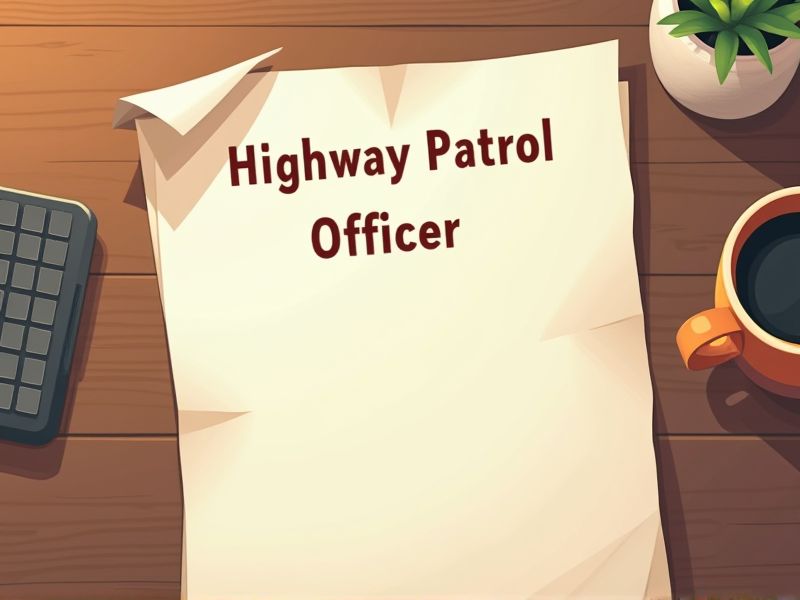
Highway Patrol Officers face complex challenges that require specific expertise in law enforcement and public safety. Acquiring certain certifications equips them with the skills to navigate high-risk situations, handle emergencies, and ensure compliance with traffic laws. These certifications also enhance their ability to effectively communicate with the public and collaborate with other agencies. Some important certifications you may need for a Highway Patrol Officer role are outlined below.
Basic Law Enforcement Certification
Basic Law Enforcement Certification equips highway patrol officers with essential skills in criminal law, allowing them to effectively enforce traffic regulations. This certification ensures they are trained in defensive tactics and firearms proficiency, enhancing public safety during roadside encounters. Legal protocol and procedures covered in the certification prevent potential violations of citizens' rights, ensuring lawful arrests and citations. The rigorous training prepares officers to manage high-stress situations on highways, such as accident scenes, contributing to efficient crisis response.
Highway Patrol Academy Certification
Highway Patrol Academy Certification is crucial because it ensures officers possess the essential skills and knowledge for traffic law enforcement and public safety. Certification provides standardized training, leading to a consistent level of competency across all officers. With certified training, officers are better equipped to handle high-pressure situations on the road, such as accidents and criminal activities. The certification fosters public trust by validating an officer's qualifications and commitment to upholding the law.
Defensive Driving Certification
Defensive Driving Certification enhances a Highway Patrol Officer's ability to anticipate and respond to potential hazards on the road. This certification ensures that officers can maintain public safety while operating vehicles during high-speed pursuits or emergency situations. The training reduces the risk of accidents and liability, protecting both officers and civilians. Certified officers are better equipped to educate the public on safe driving practices, fostering a culture of safety on highways.
Emergency Vehicle Operation Certification
Emergency Vehicle Operation Certification ensures Highway Patrol Officers are equipped to navigate high-speed pursuits safely, minimizing risk to themselves and the public. Training enhances an officer's ability to make split-second decisions, critical for effectively responding to emergencies. Understanding vehicle dynamics and control reduces the likelihood of accidents during high-pressure situations. Certification promotes standardized procedures, fostering consistent responses across officers during high-stress scenarios.
Firearms Proficiency Certification
Firearms proficiency certification trains highway patrol officers in precise handling and shooting techniques, enhancing their ability to respond effectively in high-pressure situations. Rigorous certification standards ensure officers meet safety requirements, reducing unintended harm during encounters. Consistent proficiency checks maintain officer readiness, crucial for public and self-defense on duty. Public trust increases when officers demonstrate professional competence, aligning with the accountability expectations in law enforcement.
Crisis Intervention Training Certification
Highway Patrol Officers often encounter situations involving individuals in crisis, which can pose safety risks and complicate interactions. Crisis Intervention Training Certification equips officers with skills to de-escalate potentially volatile encounters effectively. By understanding signs of mental distress, officers can reduce the likelihood of force, aligning with community and legal standards. Improved crisis management can enhance public trust and lead to better outcomes for individuals experiencing emergencies.
DUI Enforcement Certification
DUI Enforcement Certification is essential for Highway Patrol Officers to accurately identify impaired drivers, reducing the risk of accidents. Proper training allows officers to administer field sobriety tests, ensuring legal procedures are followed. Certification enhances officers' skills in utilizing technology like breathalyzers, improving evidence collection. By being certified, officers contribute to a safer traffic environment, lowering DUI-related fatalities and injuries.
First Aid/CPR Certification
Highway Patrol Officers frequently encounter emergencies where immediate medical response can be crucial, and CPR certification equips them with the skills to handle cardiac arrests and stabilize victims until further medical help arrives. Highways are common sites for accidents, and first aid training enables officers to effectively address injuries and prevent complications at the scene. Certification ensures that officers meet standardized requirements, promoting a cohesive and reliable response across different jurisdictions. Knowledge of first aid and CPR enhances public trust and officer confidence, establishing a safer environment for travelers.
Accident Investigation Certification
Accident investigation certification equips highway patrol officers with the skills to accurately assess accident scenes, leading to improved understanding of crash dynamics. With this certification, officers gain the ability to identify crucial evidence, which enhances the accuracy of accident reports and facilitates legal proceedings. Enhanced investigation capabilities contribute to developing preventive measures, reducing future accident occurrences on highways. Data-driven insights from certified officers' investigations inform policymaking and infrastructure improvement.
Tactical Operations Certification
Tactical Operations Certification provides highway patrol officers with specialized skills for managing high-risk situations. Certification equips officers with advanced techniques for de-escalation and crisis management, reducing potential harm. Training ensures officers can effectively coordinate with other emergency services during incidents. Certification leads to increased public trust and officer confidence in handling complex scenarios.
Summary
When you achieve additional certifications as a Highway Patrol Officer, your expertise and effectiveness in enforcing traffic laws are likely to increase. These certifications can enhance your skills in accident investigation, traffic management, or specialized enforcement techniques, leading to a decrease in traffic incidents. As a result, public safety may improve significantly due to your enhanced capability and knowledge. Your career opportunities within law enforcement may also expand, offering potential for advancement.
